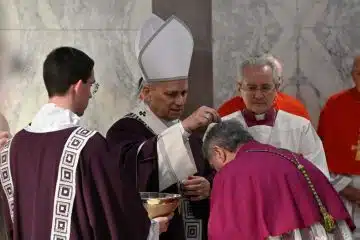The Catholic Moment: Why do we study?
Thursday, August 19, 2010
By Father Earl Fernandes
The academic calendar has ruled my life. From 1977 until 2002, when I was ordained a priest, I was in school. After that, I spent time as a high school teacher, a graduate student and a seminary professor.
Each autumn means another school year. There is a certain excitement about the renewal of relationships at the start of the school year. Students are happy to see their friends again after the boredom of the waning weeks of summer. Whole communities are eager to experience the familiar sights and sounds of football, cheerleading and the marching band. There are those who are excited about shopping for new school supplies. Teachers, understanding their vocation, take up with enthusiasm their great responsibility. But what is education really about?
As the school year begins, we reflect on a simple question: Why do we study? Many today see studying in a very practical, instrumental way: “If I acquire this knowledge or skill, then I can do X, Y or Z.”
Others say, “If I study these subjects and do well, I can attend a good high school or college.” College students see their studies as a means to achieve career goals and to have a good income. Even professional institutions, like law and medical schools, teach people to carry out technical tasks. But isn’t there something more to an education than a means to an end? Do we study and learn just to work?
In St. Augustine’s Confessions Augustine meets a man, Ponticianus, who tells the story of two wealthy, well-educated Christians who were working in the Imperial Court at Trier. The two men were walking on the outskirts of town and encountered some monks who gave them a copy of the Life of Saint Antony by St. Athanasius.
One of the two men was inspired by Antony’s life in the desert and asked his friend, “Tell me now; in all this hard work which we do, what are we aiming to do? What are we aiming at? What is it that we want? Can we have any higher hope at court than to become friends of the emperor? Indeed does not one have to go through danger after danger simply to reach a place that is more dangerous still? And how long will it take to get there? But if I want, I can be the friend of God at this moment.” They left their worldly posts to pursue the higher things.
School is hard work, but the questions the man asked are the same questions that students, teachers, and parents should be asking: What are we aiming at — to have a good job and to gain wealth and influence? Will this not pose some danger to us? Working hard and doing well in school is important; we gain knowledge or “book smarts.” Is that all we want out of education for our children? Or is there something more essential than merely instrumental knowledge?
Some scholars believe that one of the men in the story was St. Jerome, who was distinguished for his learning, his knowledge of languages and for his love of Scripture. He gave up a promising “worldly” career to be the friend of God. To be the friend of God, to have deeper knowledge of Him, means attending a different school — the school of prayer. It means being still and gazing upon the face of God. It involves seeking the true, the beautiful and the good, which are not always discovered in a textbook. Without God, we may be smart but we will never attain true wisdom.
St. Thomas Aquinas teaches that “there can be no complete and final happiness for us except in the vision of God.”
At the start of a school year we might reflect on the following: “How can I come to a greater knowledge of God through my studies?”
Father Fernandes is an assistant professor of moral theology and dean of Mount Saint Mary’s Seminary.













